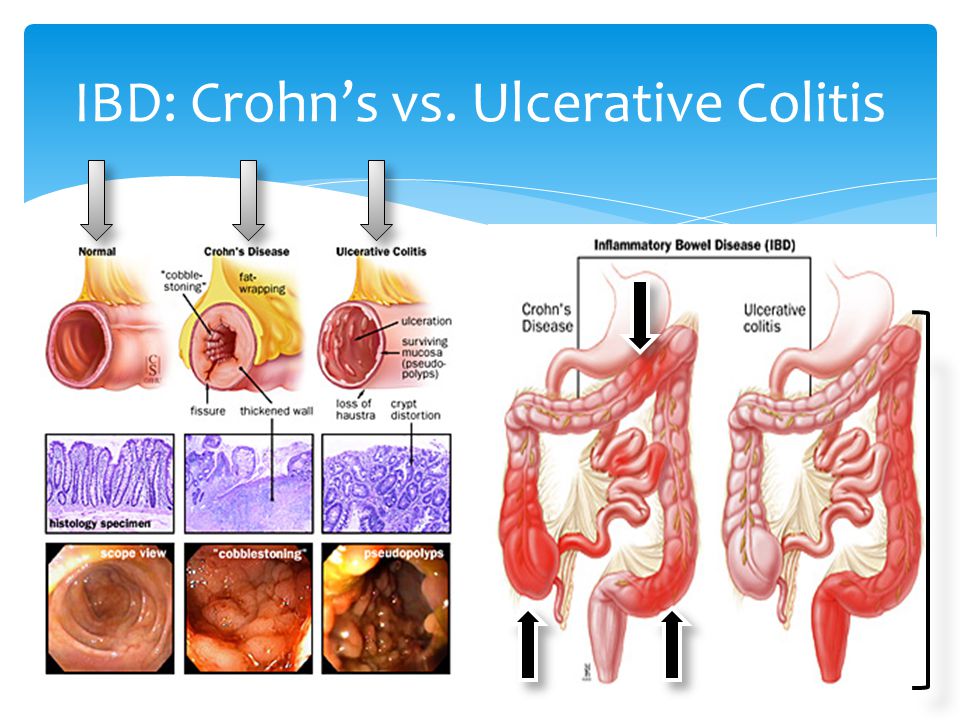
The severity of UC varies from person to person. This means that people with UC need to manage it throughout their lives. UC is a chronic condition and currently has no cure. A person can also swallow a pill-sized camera that records images as it travels through the intestinal tract. Upper endoscopy : An endoscopy involves sending a small camera attached to a scope through the mouth and down into the small intestine. Radiology tests may include X-rays, CT scans, and contrast studies. They also look for biomarkers of inflammation in stool.ĭiagnostic imaging: A colonoscopy cannot send images of the entire colon, so doctors use radiology to check hard-to-access areas.

Laboratory tests of blood and stool samples: Doctors look for blood biomarkers of inflammation, including C-reactive protein and the erythrocyte sedimentation rate. Other methods can help doctors diagnose UC. Colorectal cancer is very treatable when caught early.Ī colonoscopy requires some preparation, and the doctor will provide specific instructions for each person in the weeks leading up to the procedure. They can identify precancerous cells and cancer early, when treatment is easier. But a person’s doctor will provide the most appropriate guidance.Įven if a person’s UC is under control, colonoscopies are still crucial. The Crohn’s and Colitis Foundation recommend that people who have had UC symptoms for at least 8 years get a colonoscopy every 1–2 years. Even people whose UC is in remission have a higher risk of colorectal cancer than people without UC.īecause people with UC have an increased risk of colorectal cancer, they should have regular colonoscopies. Healthcare professionals use colonoscopies to screen people with UC for colorectal cancer. It is essential to manage the condition and support overall health, and regular colonoscopies are part of this process.ĭoctors use this test to monitor the inflammation and condition of the intestinal lining and to see how well the current treatment plan is working and whether it needs adjusting. The aim is to reduce inflammation and heal the colon. Learn more about how doctors diagnose UC.Īfter diagnosing UC, the doctor prescribes treatment, usually medication. They can also determine the severity of UC and see how much of the colon is affected. If a person has symptoms of UC, a doctor may recommend a colonoscopy to diagnoseTrusted Source the condition.ĭuring a colonoscopy, doctors can identify characteristic areas of damage, swelling, inflammation, and sores in the intestine. The first is to diagnose the condition, the second is to check how well treatments are working, and the third is to screen for colorectal cancer. There are three reasons that a person with UC needs a colonoscopy. They also check for precancerous growths called polyps.Ī colonoscopy is a minor procedure, but many people find it useful to know what to expect. To examine the inside of the large intestine and rectum, a doctor uses a colonoscope - a thin, flexible tube with a small camera and a light.ĭuring the test, the doctor looks for signs of inflammation, ulcers, and any other abnormalities. The doctor also uses it to screen for colorectal cancer.
#Ulcerative colitis colonoscopy findings how to
In this article, learn more about the purpose of a colonoscopy, how often someone with UC needs one, and how to prepare for it.Ī colonoscopy is a test that can help a doctor diagnose UC, including how severe it is and how much of the colon is affected. Because people with UC have an increased risk of colorectal cancer, doctors also use this test to screen for cancer regularly. This helps them diagnose UC, check the severity, and see how well treatment is working.

While experts are not entirely sure what causes UC, they know that it involves the immune system mistaking healthy cells for unhealthy ones.Ī doctor uses a colonoscopy to examine the inside of the colon, which is also called the large intestine. It is a form of inflammatory bowel disease, which affected about 3 millionTrusted Source adults in the United States in 2015. Ulcerative colitis (UC) is an autoimmune condition that affects the digestive system.

Chronic diarrhea, weight loss, and abdominal pain are all symptoms of ulcerative colitis, which causes ulcers to form in the large intestine or rectum.


 0 kommentar(er)
0 kommentar(er)
